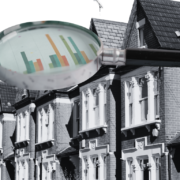Are you thinking about adding to your portfolio with a new property? Or perhaps looking at selling one of your assets to free up some capital? If so, you’ll need to perform a property market analysis to ascertain the value of your property.
There are various tools and service providers out there who can actually do this for you. However, if you’re a seasoned professional in the real estate investment world, you’ll probably be more than capable of undertaking a certain amount of this process yourself.
Here’s what you need to know about researching the market value of your property investments.
Why should I research the value of my property?
Achieving an accurate estimation of a property’s value can be useful for many reasons. Essentially, studying the market values of similar properties currently on the market will allow you to determine the market value of your own property.
This information could then influence how much you sell or rent a property out for, or how much you are willing to offer for a new property on the market, for instance.
A firm grasp of market values will allow you to make informed decisions and negotiate with confidence. But remember, conducting your own market analysis is subjective. If you want something that’s more legally sound, then you will need to get an appraised value, by a licensed appraiser.
Major factors that affect the market value of your property
- Area and neighbourhood
- Size of property
- Land area
- Number of bedrooms and bathrooms
- Additional rooms or extensions
- Additional facilities such as parking and garages
- Number of floors
- Age of the building
- Materials used on the property
- Amenities and other features like a balcony, veranda, swimming pool, garden, fireplaces etc.
- Distance to local amenities and transport
- Distance to schools and green spaces
- Modification that has been undertaken on the property recently
How much are similar homes being sold for?
The first step is to research how much other homes similar to yours are being sold for. While it might not be easy to make a direct comparison – as every home is different – you can find homes that match up with yours in regards to the major factors listed above.
You can find valuations of these properties by checking estate agents listings online. There’s a ton of information available if you simply search for properties in your area on platforms like Zoopla for instance.
Try to check a few different sites for a more objective take on the market. While most of the big sites will use the Land Registry and the Registers of Scotland for their information, there may be differences between agents.
How much did the property sell for in the past?
While the prices of properties constantly change depending on the state of the market, and factors such as supply and demand, knowing how much a property was sold for in the past can be incredibly useful. You can use the information you gather as a benchmark for other factors.
For instance, if your property once sold for £150,000 and prices in the area have since risen across the board, then the value of your property will therefore likely be higher than this figure today.
You can find this information from places like The Nationwide House Price Calculator or other similar tools that record house prices at the time of sale. However, if you can’t find the last sale price of your property, then simply check a similar property in the area – the house next door, for instance.
What are the recent price trends for the area or nationally?
Taking a step back, you should review the overall price trends of the market. This means checking how many properties are selling in your area, and for how much, as well as the state of the regional or national market.
Think about whether now is a good time to be buying or selling. This will affect demand for your particular property as well as the likelihood of an individual offering the asking price if you are selling up, for example.
The Land Registry collects official data on real sales, recording basically all residences that are sold in England and Wales. Various companies or organisations such as banks like Halifax, or lettings agents like Savills, also release their own UK House Price Index reports that can give you a good idea of what is going on in your local property market.
What are online property valuation tools saying?
There are a number of tools online that you can use for a rough estimate of your property’s value. These platforms will use a number of different methods to figure out an average value for a property before providing you with an estimate.
While these sites can’t be relied upon to be completely true representations of the health of your local property market, they are another useful addition to your overall understanding of your property value. Property Price Advice, for instance, offers a free online valuation service that will only take a few minutes to complete.
What are the local asking prices?
When checking sites like Rightmove or Zoopla, you’ll be able to see hundreds of local asking prices. However, these are the values that owners are hoping to get for their properties rather than the prices they sell for.
When reviewing these prices, make sure you take them with a pinch of salt. Sometimes, negotiations during the buying process could mean properties sell for much less than the price that is advertised online.
To get a full picture, try and search for ‘sold prices’ rather than simply looking at current adverts. This is sometimes possible on certain platforms by clicking a search filter criteria or navigating to a certain section of the site.
What’s the area actually like?
A really worthwhile thing to do is to research the area. This means going beyond the surface and discovering the local history and context. Crime rates, for instance, may not be immediately apparent, but if you do a quick search on Police.co.uk, you’ll be able to find crimes that were committed in the area. Don’t forget that a great deal on an HMO means nothing if renters are afraid to live in the area!
Also, check things like flooding issues or subsidence risks. Homecheck offers a good house evaluation that collects data from places like the Environment Agency and the British Geological Survey. It will be able to tell you whether there are any serious environmental problems you should know about as well as the risk of flooding and other risks to your property’s value.
Reaching your conclusion
All of this is to say that there is no exact science behind an evaluation of your properties market value, but there are tons of methods and tools that you can use for a reasonable estimation.
It’s just as important that you don’t overestimate the value of properties that you invest in as it is not to underestimate this value. The end goal should be a well-performing asset the attract buyer or enter for a profitable price, within a time frame that serves your purposes as an investor.

























Comments